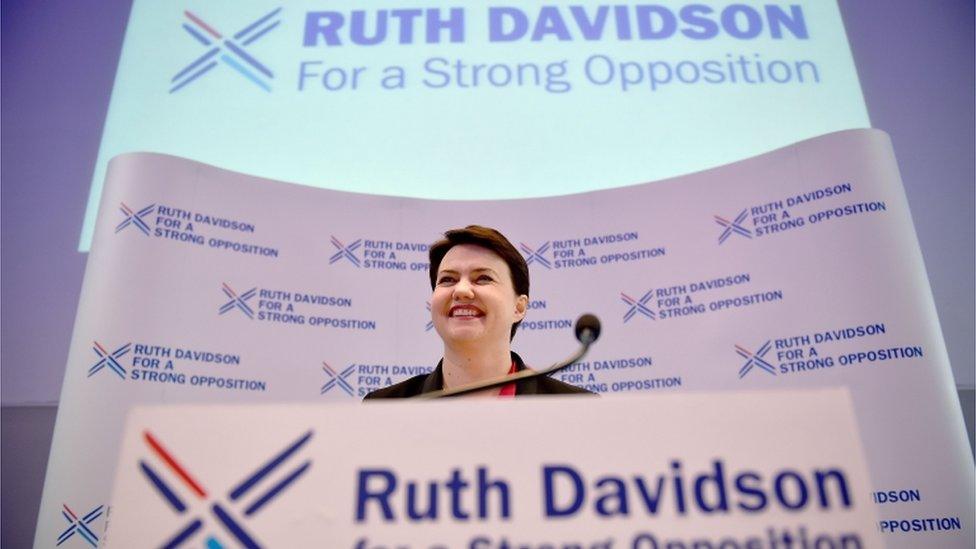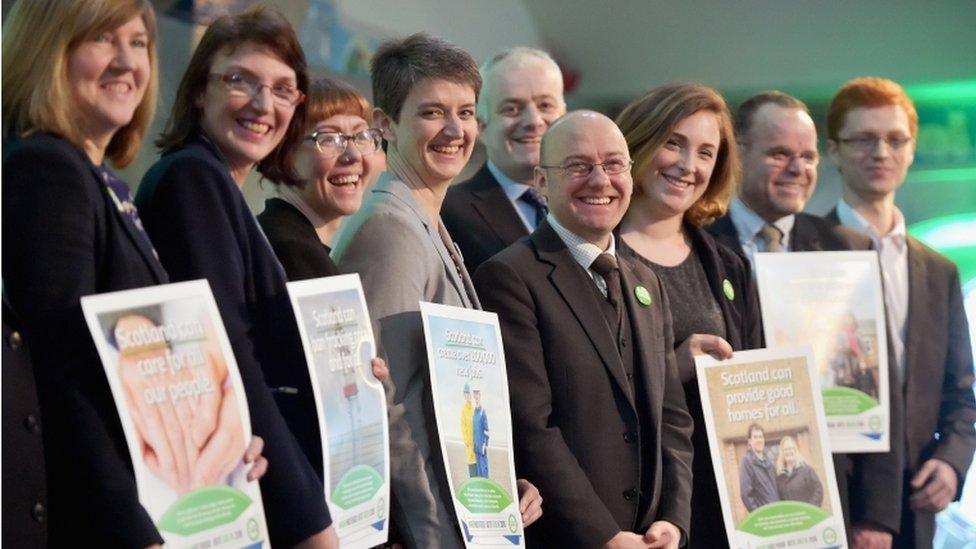Holyrood 2016: Scottish Conservative manifesto at-a-glance
- Published

The Scottish Conservatives have published their manifesto, external ahead of the Holyrood election on 5 May. Here are some of the key points.

Key messages
Unusually for an election manifesto, Scottish Conservative leader Ruth Davidson seems almost at pains to point out that she has no chance of winning the election and becoming first minister.
Instead, she describes the manifesto as her application for the job of providing strong opposition to the SNP - a role she says has been left vacant by Scottish Labour for the previous nine years.
She argues that strong opposition results in better government, and says she will:
hold the SNP to account
fight against any attempts to "drag our country back to a second independence referendum"
make the Scottish government focus on the "issues that matter"

Saying no to a second referendum
Needless to say, the Scottish Conservative and Unionist party remains staunchly opposed to Scottish independence.
The party states in its manifesto that the SNP is on course to win a third term in government, and that only the Scottish Conservatives can provide the "strong opposition which will stand up against the SNP's drive for independence".
The manifesto says the Conservatives will:
oppose any attempt by the SNP to hold an independence referendum during the term of the next parliament - regardless of the result of the EU referendum in June
support a "fresh, positive drive to promote the benefits of the Union" which will "not focus on the downsides of independence - though there are many - but on the strength and values of the Union".
support the creation of a new UK-wide effort to promote the strengths and values of the Union

Holding the SNP to account
The manifesto argues that in order to get better government, Scotland needs a strong opposition which will hold the Scottish government to account.
It says that the SNP has used too much of its time in office focusing on independence rather than the job of running Scotland.
And it says the Scottish Parliament has too often failed to provide the necessary scrutiny and challenge on "flawed government decision-making" which it claims led to policies such as the introduction of Police Scotland and the Named Persons legislation.
With the SNP seemingly on course for another victory, the Conservatives portray themselves as the only opposition party that can "keep the SNP in check and hold them to account".

Taxation and welfare
On tax, the Conservatives believe it is vital Scotland retains competitive rates of income tax which are no higher than in the rest of the UK.
It also proposes a freeze in business rates to help to stimulate the Scottish economy and boost jobs, and opposes moves.
The Scottish Conservatives also say Scotland can take a "different path" on welfare and that "blaming UK governments is no longer the go-to answer".
It says it wants to see a Scottish welfare system with three basic principles at its heart:
it should primarily support the most vulnerable
it should be flexible and personalised
and it should give those who can and want to work the opportunities and support to do so
On public spending, the party believes that more robust management can deliver huge savings for the public purse.

Education
The Conservatives believe that education is the biggest Achilles heel of the Scottish government, particularly in the persistent difference in life chances between those in the wealthiest and most deprived areas.
The party proposes:
extending free nursery hours to a higher proportion of disadvantaged two-year-olds and disadvantaged one-year-olds in the first instance
there would also be a gradual expansion of part-time hours to all one to four-year-olds
schools and school leaders should be given "real decision-making powers and the freedom to express their individual values, ethos and character"
new measures should be put in place to ensure the best possible teachers are recruited
the Scottish government should be "far bolder" in measuring progress in the education system

Further and higher education
Uniquely among the major Scottish parties, the Scottish Conservatives are not committed to the concept of free university tuition.
Instead, they want to see graduates pay back £1,500 for every year of their degree once they are earning more than £20,000 a year.
The party says this would raise £100m by the end of the parliament, with exceptions put in place for part-time, postgraduate, disabled and low income.
It argues that this policy would help poorest students the most, with the party also offering full bursaries to young people who have been carers.

Health
The manifesto states that the NHS is one of the country's most cherished institutions, but that the SNP has failed to properly invest in.
It proposes:
protecting health spending in Scotland through a health guarantee - ensuring the health budget rises annually by whatever is highest out of inflation, 2% or Barnett Consequentials, and raising £1.5bn over five years
gradually reintroducing prescription charges to raise £65m by the end of the parliament to invest in nurses, health visitors or GPs as well as improve access to new medicines
there would be exceptions for children, pensioners, pregnant women, disabled people and many people with long-term conditions
an additional £300m should be invested in improving mental health treatment over the next parliament
PE should be increased and improved in primary school
financial incentives for football clubs across Scotland's top four divisions to play young Scottish players should be "explored"
this funding should be committed to facilities, training and infrastructure improvement which would all be linked to youth sport

Housing
Warm housing is a key policy for the Scottish Conservatives, with the party saying it would call for £1bn of funding to go towards meeting a fresh target for every home to have an energy efficiency rating of "C" or better by the end of the decade.
The party also wants to see an additional 100,000 homes built over the next five years, about half of which would be classed as "affordable".
And it wants to reintroduce Right to Buy in Scotland and ringfence all funds raised for future social housebuilding.

Economy
The party says its key priorities are:
Freezing business rates and conducting a thorough review
Developing skills that align with business demand through vocational education and skills training, with an additional 10,000 apprenticeship starts every year by the end of the parliament
Supporting rural businesses across Scotland

Justice
The manifesto describes the introduction of a centralised police service as a "significant failure" of the Scottish government.
It calls for a "thorough review" of the current arrangement to be carried out as soon as possible, which would also look at ways in which local accountability can be restored.
Other proposals made include:
more Community Payback Orders should include a work element to make them a "credible alternative" to prison
those breaching community sentences should be sent to prison for 24 or 48 hours
life should mean life for some of the worst offenders, who would not have the right to apply for parole
the introduction of two levels of anti-social behaviour Fixed Penalty Notices, with a higher penalty for more serious instances
allowing police officers to "get on with the job" instead of filling back office vacancies

Infrastructure
The manifesto states that High Streets and town centres are still in decline across Scotland, with little sign of resurgence after the recession.
It says that further support should be given to projects that bring empty properties back into use - often converting empty business properties into affordable housing.
It also proposes extending the present Enterprise Area approach to a more local scheme and creating a network of Regeneration Zones.
The manifesto also proposes:
prioritising and accelerating the "painfully slow" rural superfast broadband rollout
councils should be allowed to put a wind farm moratorium in place if they wish
community and voluntary bodies should be given the right to express interest in taking over a specific council-run service
the A82 in Argyll and the Highlands, the A75 in the south west (bypassing Springholm and Crocketford), the A1 in the Borders, and the A90 in the north east should all be upgraded
the use of electric vehicles should be an objective, for example by expanding the number of charging points at transport hubs across Scotland
the free bus pass scheme should be extended to community transport
progress should be made on bigger rail projects, such as high speed rail, as well as smaller, but locally invaluable projects such as a suburban Edinburgh South railway and the restoring of Reston and East Linton stations

What do the other party manifestos say?
- Published12 April 2016
